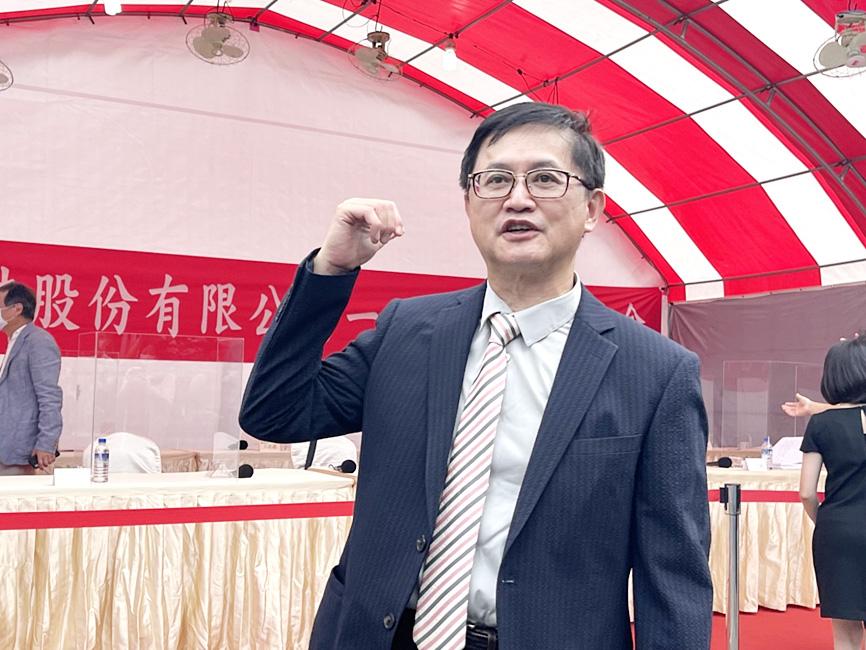Shortages of key components and raw materials remain Pegatron Corp’s (和碩) greatest challenges, but the situation is expected to ease in the second half of the year, the company said yesterday.
Speaking at the firm’s annual general meeting in Taipei’s Beitou District (北投), Pegatron chief executive officer Liao Syh-jang (廖賜政) said that production cannot keep up with orders.
“We’ve been working with customers and suppliers, even using capacity at our subsidiary to help out,” Liao said. “The shortage of components and raw materials is our greatest challenge, but our orders are very strong.”

Photo: CNA
The Apple Inc assembly partner is looking to improve the utilization rate at its factories to alleviate shortages and meet demand, Liao said.
“I believe the situation will improve in the second half of the year from the first half,” he said.
Effects of the COVID-19 pandemic have slowed production at Pegatron plants in Malaysia and Vietnam, although the facilities have been operating at least 60 percent of capacity, Liao said.
Pegatron would continue expanding its production capacity worldwide, Liao said.
“In addition to expanding our Taiwanese facilities, Pegatron is looking to increase production in Vietnam, India and North America to prepare for future demand,” he said.
Describing problems to keep up with orders as a “sweet burden,” Pegatron chairman Tung Tzu-hsien (童子賢) said that the company is cautiously considering investments, as it is trying to avoid making hasty decisions to expand amid the current red-hot market situation.
“Our investment decisions need to make sense in the long term. New facilities take 10 years to amortize costs,” Tung said. “We need to carefully evaluate how much of the demand is real, how much of it is transitory and how much of it is not real demand, but the result of panic buying.”
Tung described the electric vehicle (EV) market as “full of future promise.”
“We are still at the initial stage of EV development, but the next 10 years hold exciting developments,” he said. “Pegatron is looking to find reliable clients to approach the EV market together.”
Once Pegatron has established itself in the EV market, the firm’s gross profit should be better than in existing mature or highly competitive sectors, he said.

KEEPING UP: The acquisition of a cleanroom in Taiwan would enable Micron to increase production in a market where demand continues to outpace supply, a Micron official said Micron Technology Inc has signed a letter of intent to buy a fabrication site in Taiwan from Powerchip Semiconductor Manufacturing Corp (力積電) for US$1.8 billion to expand its production of memory chips. Micron would take control of the P5 site in Miaoli County’s Tongluo Township (銅鑼) and plans to ramp up DRAM production in phases after the transaction closes in the second quarter, the company said in a statement on Saturday. The acquisition includes an existing 12 inch fab cleanroom of 27,871m2 and would further position Micron to address growing global demand for memory solutions, the company said. Micron expects the transaction to

Vincent Wei led fellow Singaporean farmers around an empty Malaysian plot, laying out plans for a greenhouse and rows of leafy vegetables. What he pitched was not just space for crops, but a lifeline for growers struggling to make ends meet in a city-state with high prices and little vacant land. The future agriculture hub is part of a joint special economic zone launched last year by the two neighbors, expected to cost US$123 million and produce 10,000 tonnes of fresh produce annually. It is attracting Singaporean farmers with promises of cheaper land, labor and energy just over the border.

US actor Matthew McConaughey has filed recordings of his image and voice with US patent authorities to protect them from unauthorized usage by artificial intelligence (AI) platforms, a representative said earlier this week. Several video clips and audio recordings were registered by the commercial arm of the Just Keep Livin’ Foundation, a non-profit created by the Oscar-winning actor and his wife, Camila, according to the US Patent and Trademark Office database. Many artists are increasingly concerned about the uncontrolled use of their image via generative AI since the rollout of ChatGPT and other AI-powered tools. Several US states have adopted

A proposed billionaires’ tax in California has ignited a political uproar in Silicon Valley, with tech titans threatening to leave the state while California Governor Gavin Newsom of the Democratic Party maneuvers to defeat a levy that he fears would lead to an exodus of wealth. A technology mecca, California has more billionaires than any other US state — a few hundred, by some estimates. About half its personal income tax revenue, a financial backbone in the nearly US$350 billion budget, comes from the top 1 percent of earners. A large healthcare union is attempting to place a proposal before